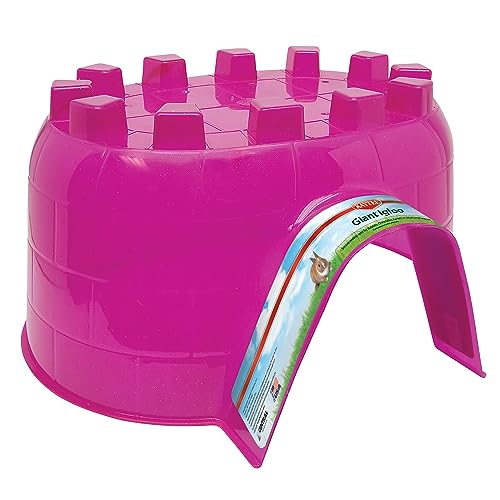Guinea pigs have a tendency to hide when you enter the room, when you reach into their cage to pick them up, or just randomly for no reason at all. However, there are very good reasons why this is a typical and perfectly natural part of guinea pig’s behavior.
Guinea pigs are prey animals and they hide because of their natural survival instincts. As prey animals, guinea pigs exhibit many traits designed to keep them safe in their natural environment.
Table of Content
Guinea Pig’s Hiding Behavior | How to Help and Encourage Your Pet?

While hiding is a natural and healthy aspect of guinea pig’s behavior, it may be discouraging to those who enjoy watching and interacting with their pets. If you want to encourage your pet to hide less frequently, there are a few things you can do. Some of them are the following:
1. Help Your Guinea Pig Trust You
Believe it or not, guinea pigs can develop special relationships with humans. While this won’t prevent your guinea pig from hiding altogether, it can certainly keep it from hiding so frequently. Here are a few ways you can help your guinea pig feel safer in your presence.
Hand Feeding
Hand-feeding your guinea pig can be a lot of fun and it is a great way to encourage it to come out of his hiding place and interact with you. If your pet shies away from your hand, take it one step at a time.
First, place food on one end of your guinea pig’s cage, and then place your hand on the other end. This will help your pet get used to the idea of eating while in close proximity to your hand. He will come to understand that your hand poses no threat to it and that it doesn’t interfere with his meal.
Slowly, day after day, begin moving your hand closer to your guinea pig while he is eating until you are able to place the food in your palm and have it eat from it directly.
Lap Time
Your guinea pig will be more likely to venture out of his hiding place if he enjoys cuddling with you. This is where lap time comes in. Make sure you have a secure area of your home that is safe from other pets and distractions. Using a towel, pick up your guinea pig and sit down on the floor, placing it gently in your lap.
Feed it his favorite veggies while talking to it in a gentle, soothing voice. Stroke it gently and reassuringly. In the beginning, keep lap time between five to ten minutes. Over time, you may find that your guinea pig will want to stay on your lap even longer.
Slow Movements
Nothing will trigger a guinea pig’s instinct to hide faster than sudden, unexpected movements. This makes perfect sense because, in the wild, predators would use the element of surprise when hunting these small creatures. Moving slowly in your guinea pig’s presence will help it feel safe.
Avoid Loud and Sudden Noises
Similar to fast and sudden movements, loud and unexpected noises will have your guinea pig running for cover. Make sure to turn off or at least turn down the TV when interacting with your guinea pig. Also, make sure other people in your home know you’re spending time with your pet so they don’t engage in loud activities during that time.
Other household pets should be happy and secure in another room, as a barking dog or other loud noises will have your guinea pig back in his hiding place in no time.
2. Provide Even More Hiding Places
It may sound counter-intuitive, but giving your guinea pig even more places to hide can stop it from hiding so frequently. Guinea pigs are good at assessing their environment.
Before coming out of their hiding place, they want to make sure there are other hiding options available in case they become frightened again. If guinea pigs are sure that they will always have a hiding place available nearby, they will be more confident about wandering out into the open.
3. De-Stress Your Guinea Pig’s Home Environment
Keeping your guinea pig’s enclosure in the right part of your home is very important if you want it to stop spending so much time hiding. If your guinea pig’s home doesn’t make it feel safe and secure, it can be a constant source of anxiety. Remember that guinea pigs have highly developed senses of smell and hearing.
Be sure to keep your guinea pig’s enclosure away from noisy, high traffic areas of your home. Also, be mindful of other pets. Your guinea pig’s enclosure should be kept away from the sight, smell, and sounds of other animals in your home.
Even docile dogs and cats that may not pay any attention to your guinea pig can be absolutely terrifying to these tiny animals. Remember, your guinea pig’s ancestors spent millennia being hunted by predators that looked similar to your dog or cat!
Guinea Pig Hiding All Day, Is This Behavior Normal?
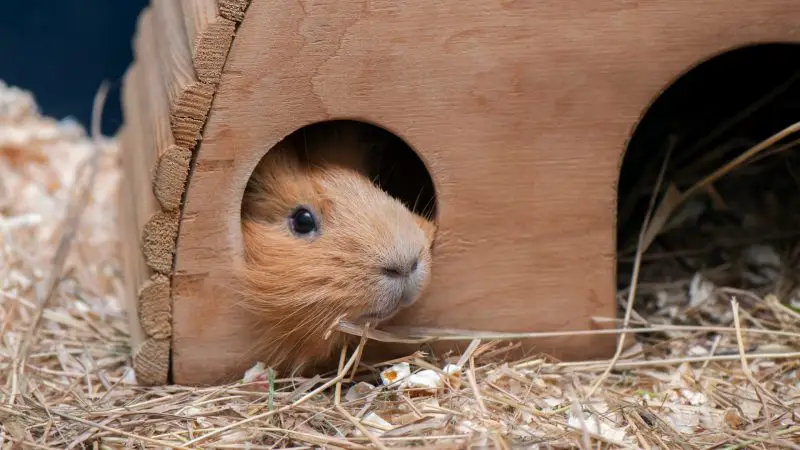
It’s normal for your guinea pig to hide. Remember that each guinea pig has its own unique personality. Some will spend most of their day hiding, while others will be more social.
Ensure that your guinea pig is at least coming out of his hiding place multiple times a day to eat and go for a quick walk around its enclosure. If your guinea pig remains in its hiding place for more than 12 hours without eating, contact a veterinarian. It is likely that your pet is sick or injured.
Do Some Guinea Pig Breeds Hide More Often Than Others?
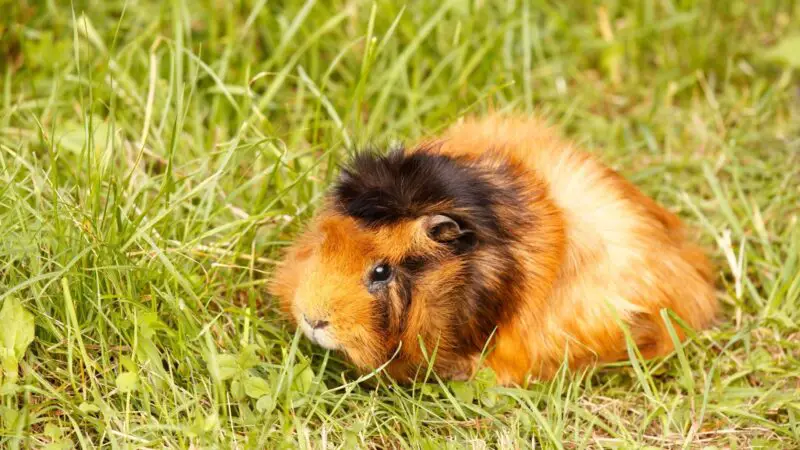
While every guinea pig comes with its own unique traits, there are some breeds that are considered less shy than others. It is reported that the two friendliest breeds are Abyssinian and Teddy guinea pigs, although this is a matter of opinion.
Before deciding to bring your new guinea pig home, talk to the current caregiver about the animal’s personality. An honest and caring seller will tell you everything they know about the guinea pig in question so that you know what to expect before bringing it home.
Related: What Guinea Pig Is Right For Me? | All You Need to Know!
Hiding Places for Guinea Pigs | Everything You Need to Know!
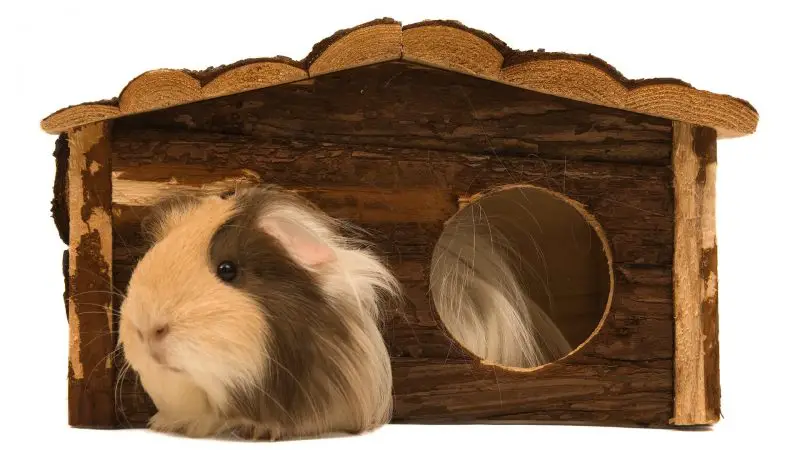
What Are the Best Hiding Places for My Guinea Pig?
These guinea pig hideouts/hideaway products are also called guinea pig tubes or guinea pig igloos (pigloo). Pigloos are igloo-shaped plastic shelters that make a perfect hiding place for your pet. There are also a number of tunnels and wood houses available for the same purpose.
- Made of durable plastic, igloos are easy to clean and stain resistant
- Encourages natural nesting instincts in small animals
- One piece construction
- Ideal for rabbits, ferrets, guinea pigs and other small animals
- Igloos come in assorted cool colors and they're made of translucent plastic so you can see your pet inside
If you’re into DIY projects or if you’re simply on a budget, try using old oatmeal containers or modified cereal boxes to create the perfect hiding place for your guinea pig. Keep in mind that guinea pigs, just like their rodent relatives, love to chew. So don’t be disappointed or upset if your guinea pig chews on his new hiding place! It is normal to replace your guinea pig’s hideout now and then.
How Many Hiding Places Does My Guinea Pig Need?
The number of hiding places in your guinea pig’s enclosure will depend on two things: how many guinea pigs you have and the size of your enclosure. Your cage should always contain at least one hiding place per guinea pig. This will ensure that at any given time, each guinea pig will have its own place to hide.
Larger enclosures should be set up with extra hiding places. This will help your guinea pig feel safe while exploring his environment. It will be more confident knowing that it always has a hiding place nearby.
Related: What Guinea Pig Cage Size Is the Best? (Proper Accommodation)
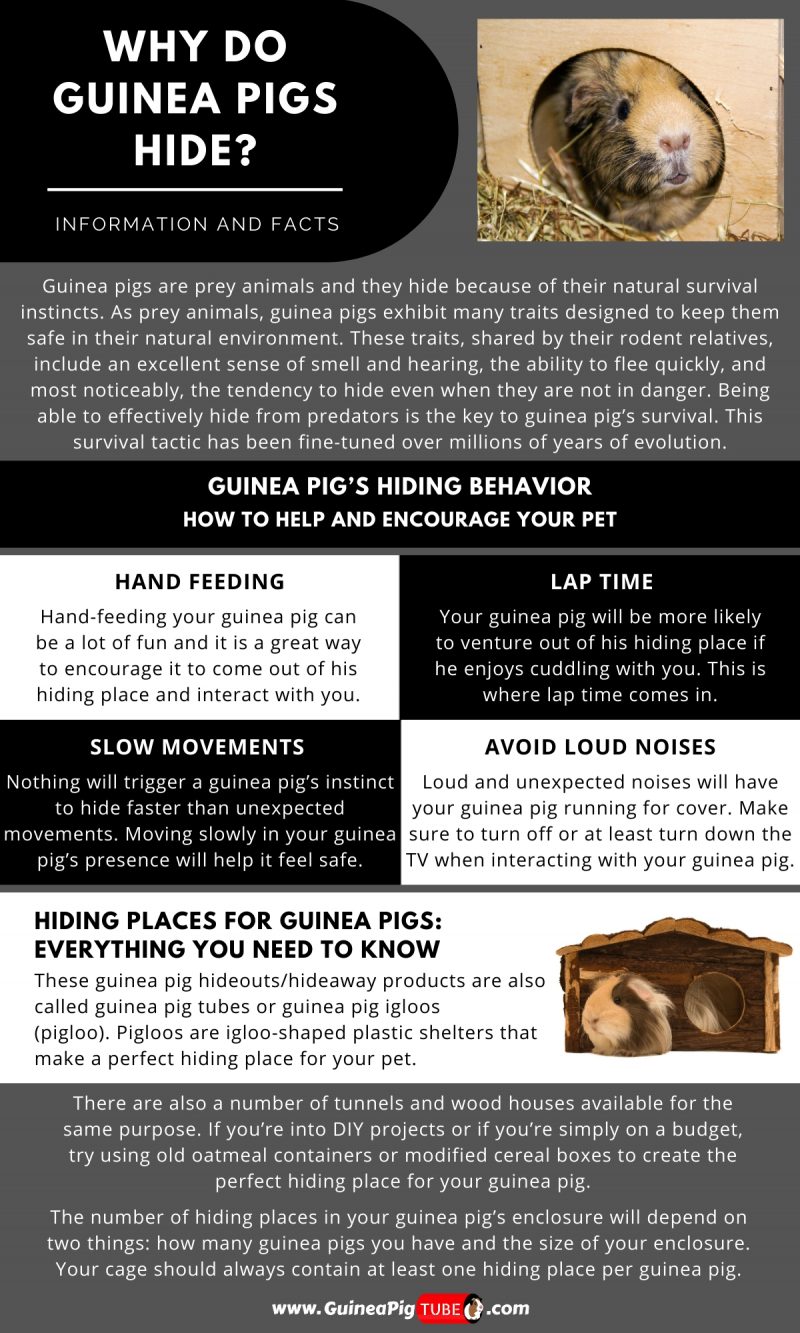
Summary
Hiding is a perfectly natural part of guinea pig’s behavior. It’s a survival instinct learned by their ancestors in the wild. Your job is to help your pet feel safe and comfortable in his environment. This will ensure a positive experience for your guinea pig and it will create a stronger bond between you two.
List of Sources
Of Domestic and Wild Guinea Pigs: Studies in Sociophysiology, Domestication, and Social Evolution
Social Experience, Behavior, and Stress in Guinea Pigs
Providing a Home for a Guinea Pig
Normal Behavior and the Clinical Implications of Abnormal Behavior in Guinea Pigs

